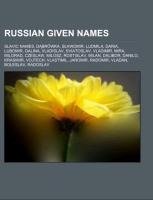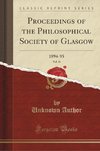
Russian given names
Source: Wikipedia. Pages: 26. Chapters: Slavic names, Dabrówka, Slawomir, Ludmila, Daria, Lubomir, Galina, Vladislav, Sviatoslav, Vladimir, Mira, Milorad, Czeslaw, Milosz, Rostislav, Milan, Dalibor, Danilo, Krasimir, Vojtech, Vlastimil, Jaromir, Radomir,... Viac o knihe
Produkt je dočasne nedostupný
12.67 €
bežná cena: 14.40 €
O knihe
Source: Wikipedia. Pages: 26. Chapters: Slavic names, Dabrówka, Slawomir, Ludmila, Daria, Lubomir, Galina, Vladislav, Sviatoslav, Vladimir, Mira, Milorad, Czeslaw, Milosz, Rostislav, Milan, Dalibor, Danilo, Krasimir, Vojtech, Vlastimil, Jaromir, Radomir, Vladan, Boleslav, Radoslav, Branislav, Miroslav, Slavena, Vsevolod, Mstislav, Vitomir, Sava, Dobromir, Sobieslaw, Ludomir, Dobromil, Bratislav, Velimir, Kvetoslav, Stanimir, Stanislava, Radmila, Godzimir, Slawoj, Sambor, Inna, Bozidar, Bozena, Jaroslav, Ctibor, Gniewomir, Vojislav, Volodymyr, Kalina, Grischa, Budimir, Ratimir, Pribislav, Ratibor, Milomir, Vadim, Sasho. Excerpt: Given names originating from the Slavic languages are most popular in Slavic countries such as Belarus, Bosnia and Herzegovina, Bulgaria, Croatia, Czech Republic, Poland, Russia, Serbia, Slovakia, Slovenia, Ukraine, and others. In pre-Christian traditions, a child younger than 7-10 years old would bear a "subtitutional name" (e.g. Niemój "not mine", Nielub "not loved"), whose purpose was to decrease the apparent importance of a child and protect him or her from the curiosity of evil powers. This practice probably derived from the existence of a high fatality rate for young children at that time. A child who survived 7-10 years was worthy of care and was granted adult status and a new adult name during the ritual of a first haircut. Generally traditional names were dominant until Slavic nations converted to Christianity (e.g. the Catholic Church, the Eastern Orthodox Church). For instance, the Council of Trent (1545-63) decided that every Catholic should have a Christian name instead of native one. Names in Poland After ban of use native non-Christian names (ordered by Council of Trent), Polish nobility (especially Protestants) tried to preserve traditional names, such as Zbigniew and Jaroslaw. Ordinary people, however, tended to choose names solely from Christian calendar, where there was only a few saints' names of Slavic origin, like: Kazimierz (St. Casimir), Stanislaw (St. Stanislaus), Waclaw (St.Wenceslaus) and Wladyslaw (St. Ladislaus). Names which referred to God (e.g. Bogdan, Bogumil) were also allowed. Names in Russia Old Russian names were based on just about any Russian word (like nickname). In the 13th century, when the number of Christian and non-Christian given names became about equal, the popularity of Old Russian names began to decline, and they progressively became nicknames or secondary names (bynames). However, the use of Old Russian names persisted into the 17th century, and even nobles continued to use them as "everyday" names (although it is al
- Vydavateľstvo: Books LLC, Reference Series
- Formát: Paperback
- Jazyk:
- ISBN: 9781157415763


 Anglický jazyk
Anglický jazyk 



 Nemecký jazyk
Nemecký jazyk 





